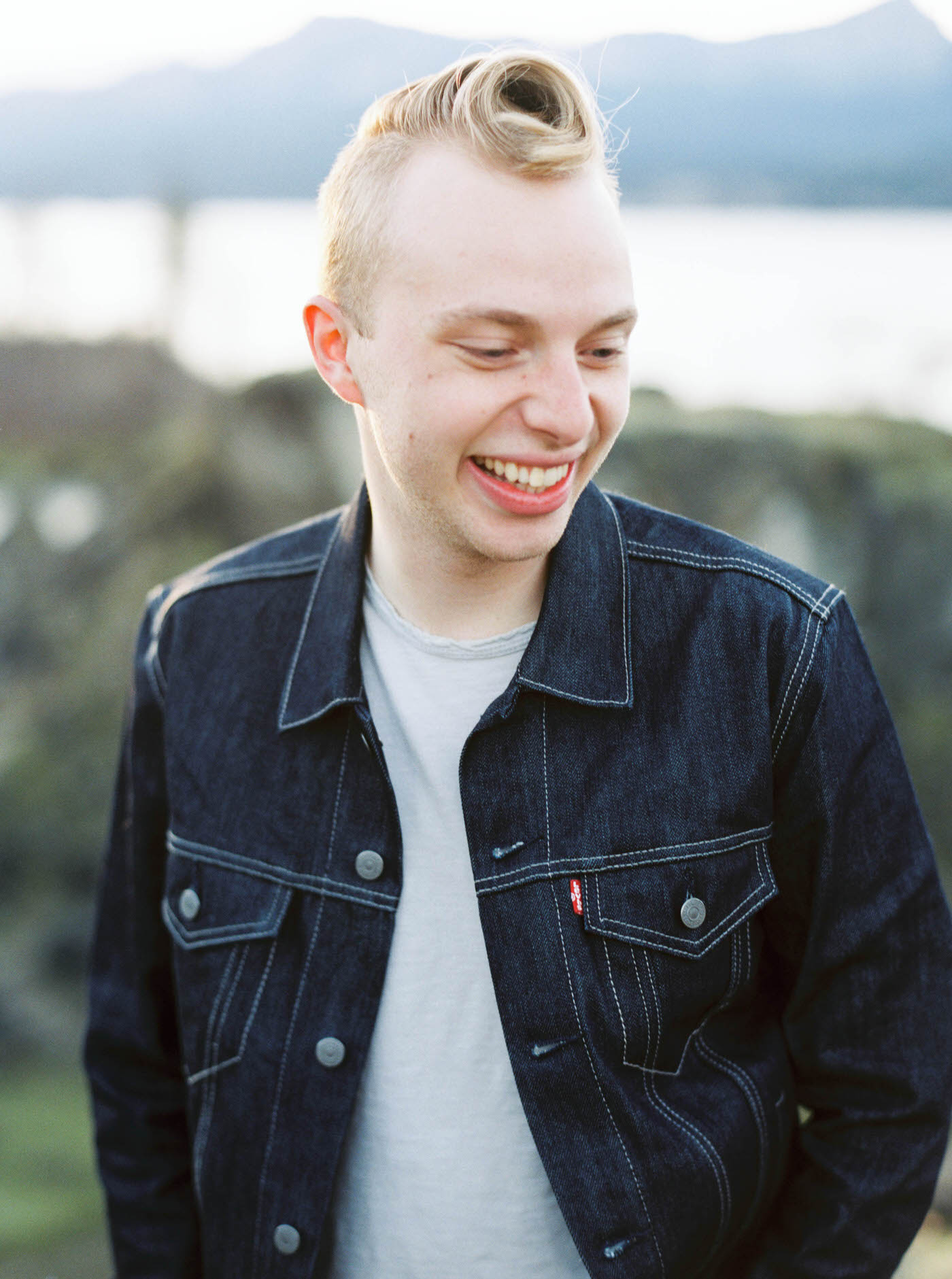It’s become a common assumption that where the word “news” lies, the word “good” sits far away from it. And while it’s true that our media does hold many less-than-encouraging stories – could it also be known for seeking out the stories of good in the world? Could this approach even help us develop a healthier relationship with how we receive, rather than avoid, any news in the media? Branden Harvey, Founder of Good Good Good which produces The Goodnewspaper, has been working towards making this a reality for a while now. This interview with him is chock-full of goodness (no surprise there), so let’s just cut to the chase.
You set out to create something pretty out of the norm for this time — not only by creating a print newspaper (when so many publications have gone digital), but a media outlet that focuses on good news. What motivated you to start this kind of (potentially risky) venture?
I remember the feeling of despair and I experienced all of 2015 and 2016. The United States was experiencing what felt like its most divisive presidential election in history. There was a growing consciousness of the systemic oppression of people of color. We were seeing photos of the heartbreaking journey of Syrian refugees fleeing war and terror. And I remember not feeling like I knew what to do about it.
I started seeking and sharing stories online of people making a difference. And the responses I got helped me understand that so many people were as hungry for good news as I was.
There’s plenty of good news online. Don’t get me wrong. But I didn’t see anyone with a nuanced enough approach to what constitutes good news. A lot of the things on the internet that flaunt themselves as good news are what we at Good Good Good like to call “feel good” news — not “real good” news. “Feel good” news is stories of cute puppies, beautiful coincidences, and people finding wedding rings. All of those things are wonderful, and important, and make the world a better place — but we want to focus on the deeper, more systemic good news.
-1.jpg)
“Real good” news is always a response to a deep problem in the world. It begins with heartbreak, and maybe even anger. And then turns that into innovation, creativity, focus, determination, and the drive to put an end to that deep problem in the world — to create a solution. We wanted to dive into the real, messy hope that the world is filled with, but doesn’t get nearly as much attention as it deserves.
I’d already started to dip our toes into these ideas. We’d launched a podcast, Sounds Good with Branden Harvey, and a free email newsletter, the Goodnewsletter — but we wondered if there was a way that we could be more effective with spreading good news. Maybe there was a way to communicate stories of good news when people weren’t in the anxiety-inducing context of their inbox or when they weren’t multitasking?
And that’s where the idea of a newspaper came from. We wanted people to be able to open up good news. And to be able to tangibly hand good news to somebody who needed it.
We thought having to flip pages might slow all of our brains down enough to help us process and actually absorb good news.
And we thought that if we were able to somehow avoid push notifications and distractions, people might even be able to take action to become good news.
Plus, we thought the name Goodnewspaper would be pretty cute.

How did you get started as a storyteller? How has that evolved for you over time?
When I was in high school I was given a camera to use for a year as a part of a photography class at my school. I immediately fell in love with the magic of capturing photos. And so I quickly turned to MySpace and Flickr and blogs to find inspiration in the photography world. And somehow, the first photographers I stumbled across were a number of photographers who were using photography as a tool to tell stories.
And ultimately, I believe every good photo does tell a story. But somehow, these photographers were doing it in a way that was blowing my mind. They were telling stories that deeply mattered. Their photos moved me, and I could tell from the comments that they moved other people as well. And so I decided I wanted to use my new camera to try to tell stories that moved me and hopefully moved others.
I found all kinds of ways to begin applying this in my small town. I started photographing senior photos (trying to tell a different story than the other local photographer was telling through his photos), photographing weddings (focusing more on relationships than table settings), and family photos (telling stories of families who had overcome great difficulties). And all of that was so fulfilling. And it made me hungry to try to tell more stories that mattered.
Somewhere along the way, I began volunteering my time shooting photos for some nonprofits I supported. And then some of them started flying me around to shoot photos across the United States. And then some of them started paying me. And then I was flying to other countries.
And quickly, I fell in love with telling stories of the impactful, meaningful work nonprofits and individuals were doing around the world. The more I leaned into this, the more I loved it.
I began using words to tell stories, in addition to just photos, and came to understand that I was ultimately passionate about storytelling, not necessarily any particular medium.
Over time I started leaning into writing more, began experimenting with filmmaking, and even began using Snapchat as an a medium to tell stories that mattered. Today, in addition to photography, I tell stories through writing, speaking, podcasting, social media, our email newsletter, and our print newspaper.
As a business owner, what has been your biggest struggle with growing your company? What has been the most helpful thing you’ve done to combat that?
In the times where I see the most personal growth, I also see the most business growth. And similarly, when I’m in a less healthy mental state, I can see the direct impact on the work I do. Because of this, I’ve been really intentional over the last few years to take care of myself and focus on growing. I’ve found it really helpful to use the Enneagram as a tool for understanding my journey from unhealth to health, and I’ve also found seeing a counselor to be incredibly beneficial. On top of this, just making sure I’m balancing spending intentional time with close friends and family has been really helpful for keeping work in perspective.
-1.jpg)
What three tips would you give to someone who wants to start a podcast?
I’ve learned a few lessons over the last few years of making our podcast:
1. Curiosity matters. If I show up for a podcast episode and I’m not genuinely curious about the podcast guest, the conversation will come out flat. I’ve had a few occasions when I’ve recorded conversations with people with huge platforms, but because I didn’t have a genuine sense of excitement or curiosity, the final cut of the episode just felt stale. We actually have opted not to air a number of episodes because they ultimately wouldn’t be beneficial to anyone.
2. Be consistent. Pick a schedule, communicate it, and stick to it. There are thousands of great podcasts out there. If you want people to show up for you, make sure you keep showing up for them.
3. If you’re not great with the technical stuff, either learn and become great with it, or find yourself someone who is great with it. I’m terrible when it comes to audio stuff, so I’m incredibly grateful to have a producer who is such a pro about it. The last thing you want is to have a great conversation that nobody ever hears because they turn off the episode after hearing a bad quality intro.
How do you believe we can better our relationship with media in our current political climate?
I’m constantly trying to figure out how to approach media in a more healthy way. Everyone’s a little bit different, and I think there are different approaches for different moments in our lives and even for different events that happen in the world, but here’s what I’m practicing right now:
-
I try not to read or listen to the news before 11am. My job is pretty focused on the news, so this is a bit wild. But there’s this idea that news isn’t really news unless it’s still relevant next week. I don’t need to read the news in the middle of my morning routine. I can allow my morning to be what fills me up and prepares me for the day. When I get to work, I can focus on my priorities for the day. Then, after all that is done, I can tune into the news.
-
I try to be intentional about where I get my primary news from. While I love finding out about the news on Twitter — that’s not really reading the news — it’s reading people’s opinions about the news. I personally work hard to get news from a variety of sources, all from places with good accountability and checks and balances. For me, I pay for subscriptions/memberships to NPR, the New York Times, the Washington Post, and the Wall Street Journal.
No media outlet is perfect, but what you want is an outlet that holds itself accountable when it makes mistakes, and whose agenda is purely to tell the truth — not to decide what happens when that truth is told.
-1.jpg)
-
When I see news that makes me sad, I try to genuinely feel it. It’s so easy to allow yourself to become numb to the heartbreak you see in the world, especially in my line of work. So I work really hard to make sure I’m actually seeing the bad news without rose colored glasses. I think this is especially important for me, a White man living with a relative amount of privilege, who focuses on the good in the world. It would be unfair for me to always skip the pain of others and jump straight ahead to the “good news”.
-
Whenever I see good news, I take a moment to write it down. We all see good news all day long, but because our brains have an internal negativity bias (it’s a weird part of all of our brain biology), we have to work 4x as hard to get good news to stick. Bad news basically sticks without us even trying.
When you write down good news, you’re taking a moment to remember that news and tell your brain it’s important. Even if you never look at that note again, you’re changing the way your brain stores that news.
- When I see something that really makes me mad or sad, I try to do something about it. I can’t do this for every single story, but when an issue really sticks out to me or keeps tugging at my heart, I try to take some small, medium, or large step toward meaningful action.

What’s one of your favorite stories you have ever published?
It might just have to be our profile on Ilwad Elman. In 2010, the conflict in Somalia was raging heavily and the majority of Mogadishu and the South Central Regions of Somalia were lost to the control of the Al-Qaeda linked terrorist group al-Shabab. Somali-Canadian social activist, Ilwad Elman, living in Canada at the time, left the safety of her new home in North America to return to her home country of Somalia. Even in the midst of terrorism, conflict, and violence, Ilwad has remained in Somalia ever since — working for peace, security, and empowerment in creative and innovative ways.
Ilwad is one of the most inspiring women I’ve ever talked to and her feature story made Issue 03 of the Goodnewspaper the most popular ever.
What does the word “calling” mean to you? How does it influence your life and the work that you choose to do?
Sometimes I wonder if “calling” is something we can only see in hindsight. Sure, I think there are some Universal Callings all of us can lean into: Love People. Create Peace. Spread Beauty. But those don’t necessarily inform the specific parts of our lives. I don’t feel at all that it was my “calling” to be a photographer or a professional Snapchatter. Or that it’s my “calling” to run a newspaper. But when I look back on the last decade of my creative life, I do see some of the threads that weave all of those things together into Experienced Callings: A passion for telling untold stories that motivate. A sense of curiosity. A call toward adventure and new experiences. A desire to spread hope. And when I’m able to look back at that, it also creates a bit of a guide on how I can follow that same path over the next decade.
It’s a beautiful guide, that can also be held loosely. I want to ensure that I still have the opportunity to be surprised and let my curiosity lead me to places I never would have expected. I continue to ask myself how I’m being led by Universal Callings and my Experienced Callings, while not holding tightly to the Hows. (If I held too tightly to the Hows, I never would have even considered experimenting with mediums as outside the norm as Snapchat and newspapers.)
-1.jpg)
You share this quote from Fred Rogers quite often: “When I was a boy and I would see scary things in the news, my mother would say to me, ‘Look for the helpers. You will always find people who are helping.’ ”
How has this quote changed the way you view the world? Is it ever difficult for you to maintain that perspective?
This quote hangs in my house. It hangs in my office. It’s featured often on @goodgoodgoodco’s Instagram. I see it every day. And I think I need that.
But there are times where, when the world feels overwhelmed with heartbreak and pain and division and suffering, I just want to let that overwhelm me. I want to be cynical. I want to feel rage.
And I’ve let all of those things happen. But when I have, it’s always felt crippling. It’s always left me feeling stuck and squished.
Looking for the helpers when it feels like there’s darkness all around is really difficult. But I truly believe it’s one of the most important things we can do.
When we take our eyes off the crisis for one moment, and choose to look for good in the midst of the madness, we take back a sense of control. And when we find the helpers, we now have a model on how we can become helpers ourselves. Then we become helpers and others see that and the cycle continues.
Photos courtesy of Good Good Good
